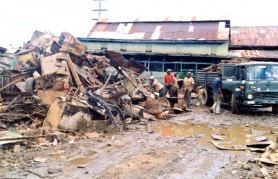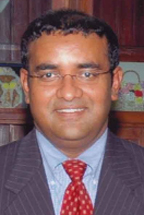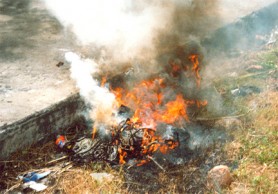Given what has transpired in the recent past scrap metal dealers may find government much more obdurate in any negotiations to remove last week’s ban on the trade announced by Prime Minister Samuel Hinds

Last week’s announcement by Prime Minister Samuel Hinds that government was once again slapping a ban on the scrap metal trade is grim news for an industry that appears unable to extricate itself from periodic brushes with the authorities. This time around, the more than 40,000 people whose livelihoods depend on the trade may face a far more protracted wait for the full restoration of the trade than that which they had to endure following similar action by government in 2007.
Government’s most recent ban, which brings both local and international trade in scrap metal to a halt “until further notice” comes in the wake of the incremental excesses of metal thieves who have reportedly shifted their attention to state property, private homes and, according to the most recent reports even such metals as they are able to pillage from tombs. The resurgence of widespread pillaging of costly and even sacred infrastructure that comprises, in whole or part any form of either ferrous or non-ferrous metals is, watchers of the trade say, a response to a gradual global return to higher levels of industrial production in the United States and Asia, the largest markets for scrap exported from Guyana, following a period of decline resulting from the global economic crisis.
Last week’s ban reflects the failure by the industry to put itself in order during a period of more than a year – between late 2006 and early 2008 – following protests by both private and public sector entities against raids on their metal-based infrastructure had triggered first, warnings and, subsequently, a ban on the trade.
Recycled metals are known to be in high demand in countries that pursue significant levels of industrial production, the recycling option being significantly cheaper that the acquisition of new metals. While the scrap industry acquires its product mostly from disused and derelict vehicles, abandoned factories and other defunct metal-based structures, the trade also thrives on the illegal acquisition of metals resulting from the theft and destruction of valuable property.

‘Don’t ask, don’t tell’
The stakeholders in the trade comprise, on the one hand, licensed dealers and, on the other, a motley collection of small and not so small hustlers who acquire their metals through a complex regimen of theft and fencing. Licensed dealers and illegal operators are locked together in what is perhaps best described as ‘don’t-ask-don’t-tell’ trading arrangements that fuel demand for scrap acquired by raiding the metal-based infrastructure of some of the country’s most important service entities. The characteristics of the industry are identical elsewhere in the Caribbean and in other developing countries and other Caricom countries, including, most recently, Jamaica, have also been forced to take action to curb the excesses of the scrap metal trade.
In September 2006, Chief Executive Officer of the Guyana Telephone and Telegraph Company Major General (rtd) Joe Singh went public regarding the targeting by metal thieves of the company’s 22 and 26-gauge insulated copper wire which, at the time, was costing the company in excess of US$500 per pound. “The high price of copper makes the stealing of telephone cable a very attractive proposition, particularly for unemployed persons,” Singh had told Stabroek Business. The thieves themselves were demonstrating the lengths to which they were prepared to go to acquire the precious metal, hauling down entire telephone poles on the Soesdyke/Linden highway in order to secure access to the insulated copper cable. Between 2004 and 2006 the telephone company responded to an average of more than 40 reports annually, of damaged or stolen cable.
The sustained losses suffered by the telecommunications, electricity and water sectors were primarily responsible for key amendments to the Old Metal Dealers Act, which amendments allowed government to halt the trade in scrap metal as and when it deemed such action appropriate to protect important infrastructure. Armed with the relevant legal authority, government moved late in 2006 to halt the export of scrap to mostly North America and India after consultations with legitimate scrap dealers failed to bring an end to the stealing of metals. The move triggered protests from licensed scrap dealers who charged that the amendment to the Old Metal Dealers Act was holding a legitimate business to ransom. Government took the position that the ‘don’t-ask-don’t-tell’ trading arrangements between the legally licensed dealers and the illegal hustlers meant that all of the stakeholders in the trade were guilty of irregularities and the ban was designed to put pressure on the licensed dealers to cease the practice of purchasing stolen metals.
In the wake of the May 2007 announcement of the ban, dealers announced the setting up of the Guyana Scrap Metal Dealers Association (GSMDA) an organisation which they said would work with government to clean up the trade. However, the GSMDA was never really in a position to deliver on its promise to work with the authorities to clean up the trade since it was unable to commit the large number of illegal operators to more stringent trading arrangements that would inevitably have outlawed them. The second challenge that confronted the GSMDA was that its support for government’s efforts to clean up the trade could not extend beyond refusing to do business with the illegal operators. There was little that they could do to prevent the illegally acquired scrap from being diverted to the thriving illegal cross-border trade which reportedly involved expatriate businessmen who travelled to Guyana to oversee the movement of scrap metal by road to neighbouring countries.
Barter arrangement
Attempts by the GSMDA to negotiate a way out of the ban for the industry hit several snags not least of which was the June 2007 charge by the association’s Technical Director Malik Cave that the authorities were ignoring evidence that “insiders” were involved in metal theft from utility companies. Simultaneously, Cave alluded to what he described as “a very active and ongoing illegal cross-border trade” in scrap metal including a barter arrangement in which scrap iron was being traded across the Guyana/Venezuela border in exchange for fuel. While the GSMDA was unable to provide proof that government was simply ignoring evidence that might steer the search for the real culprits in other directions, what quickly became clear was that neither the victims of the metals’ theft nor the authorities possessed the capacity even to reduce significantly let alone halt the illegal scrap iron trade.

Late in June 2007, the Prime Minister threw the scrap metal dealers a lifeline by publicly declaring that the jury was still out on the future of the sector and the GSMDA announced, simultaneously, that it was “making headway” in its talks with government. Less than a month later, however, the GSMDA clashed with GT&T after the latter vehemently declared in a letter sent to Stabroek Business that the association’s claims that its employees were involved in cable theft were false. At the same time GT&T security sources declared that cable losses were continuing unabated, a disclosure that may well have contributed to a delay in removing the ban on the trade.
Mounting concern over the crisis that was now confronting the sector saw the intervention of President Bharrat Jagdeo and following a September 5, 2007 meeting with the President, Cave reported that Jagdeo’s position, like the Prime Minister’s, was that government would be prepared to consider lifting the ban only in the face of demonstrable evidence that the association was supportive of official efforts to bring an end to the vandalism and theft that was partially fuelling the industry. The 2007 ban of the trade which had included exporting had left thousands of tons of scrap metal stored in containers awaiting shipment overseas and Cave also disclosed that the President had requested an inventory of the containers, a request which the association interpreted as a signal from the President that he might be prepared to ‘flex’ on the export of scrap metal already in possession of the dealers.
That, indeed, proved to be the case. Towards the end of September 2007 the GSMDA secured the first breakthrough in its negotiations with government with the announcement by the Prime Minister that 54 containers of scrap metal which had been lying on wharves for several months had been cleared for shipping, mostly to North America and Asia. The breakthrough, however, had been secured at a high price since the exporters had by then incurred millions of dollars in storage fees and other costs resulting from the protracted delay. At the same time, while the authorities had decided to grant scrap metal exporters a temporary measure of relief, local trading remained closed pending a satisfactory understanding on the cleanup measures sought by government.
Differences
Even as the GSMDA continued its negotiations with government, however, differences broke out within its ranks. In October 2007, the association’s chairman, Percy Cole, a licensed scrap metal dealer, charged that Cave, whom he said had been recruited to assist in the negotiations with government, was acting without the authority of the organisation. Cole subsequently charged that Cave had himself become directly involved in the scrap metal trade, a charge which Cave never specifically denied. What appeared to be a power struggle between the two men led to Cave’s removal from the organisation in November 2007. Cave’s departure from the GSMDA was not universally popular with its members, some of whom argued that whatever his transgressions there was evidence that Cave had made some progress in his negotiations with the government. Inevitably, a split occurred within the organisation from which it has never recovered.
In November 2007 also, the government announced the lifting of restrictions on the export of ferrous metals. However, primarily because of the ongoing high level of copper, mainly from GT&T, it kept the ban on trade in non-ferrous metals in place. Additionally, it sought to police the sector more heavily by directing that the export of metals be preceded by inspections of containers by representatives of the utility companies that were reporting losses. At the same time the GSMDA disclosed that it was seeking to conclude separate agreements with the utility companies that would commit them to helping combat the trade in stolen metals.
Evidence that only limited headway had been made in the fight against illegalities in the scrap metal trade surfaced in December 2007 when GT&T announced that its cable losses during that year “could be as high as $20 million.” Indeed, a senior GT&T security official disclosed that for a period during that year the company had faced at least two thefts per week. Another telephone company source declared that cable theft was likely to continue unabated until measures were put in place to reduce the cross-border trade. The GSMDA persisted in its contention that the theft of the telephone company’s insulated copper cable was being masterminded by some of its own employees. Government, however, was not buying the argument, maintaining its position that the normalisation of the trade could only be considered against the backdrop of hard evidence that the legitimate traders were actively decoupling their own operations from those of the metal thieves.
‘Business relationship’
One trader with whom Stabroek Business spoke following last week’s ban and who admitted to a “business relationship” with metal thieves declared that it was “never really feasible” to expect that the GSMDA could fully honour a commitment to government “to cut themselves off from the other end of the trade.” Asserting that the trade, by its very nature, could not possibly thrive in transparent buying and selling relationships the trader told Stabroek Business that in many, perhaps most cases, legitimate operators “have no really foolproof way” of determining the origins of their purchases. “The fact is that if you turned a seller away one of your competitors would buy the scrap that is being sold, anyway.”
Evidence of a sustained lack of trust between government and scrap dealers had the effect of continually stalling the talks between the two sides on the issue of normalising the trade. During the latter months of 2007, particularly, negotiations continued to be affected, first by continued reports of raids on metal-based infrastructure by thieves, and secondly, by the financial quagmire into which the licensed metal dealers were sinking; sustained as a result of both loss of earnings and mounting demurrage fees arising out of the pileup of containers of scrap on local wharves beyond those for which the dealers had received approval for export. The third challenge that faced the scrap metal dealers was what appeared to be widening divisions in their ranks arising out of earlier differences between Cole and Cave and while government had effectively blocked the legitimate export of scrap metal, increasing evidence was emerging that the authorities were unable to staunch the illegal flow of metals across the country’s land borders.
By late 2007 evidence had begun to emerge of a reduction in the frequency of metal theft and late that year the government moved to lift altogether the restrictions on the export of ferrous metals. By then, however, the industry had long been thrown into chaos. Unpaid demurrage fees had resulted in shippers refusing to handle the export of scrap metal and when Cave – no longer a GSMDA functionary – moved in to negotiate with the shippers, some dealers welcomed the move, issuing a public statement expressing their support for the initiative that Cave had taken.
GT&T began 2008 by launching a public information campaign designed to recruit communities to its side in the battle against cable theft. The company’s position was premised on a line of reasoning that committed “stakeholders” -telephone service subscribers – to joining the fight against raids on its installations by copper thieves since such raids, and the ensuing destruction of telecommunications infrastructure were temporarily denying those very stakeholders, including business enterprises, of their highly valued telephone services.
What may have removed the intensity from the scrap metal row over the past 18 months is the reduced global demand for metals resulting from reduced industrial production. However, the Prime Minister’s most recent ban signals, first, a resurgence in the demand for scrap and, secondly, that efforts to clean up the local trade have not met with a great deal of success. On the one hand, the negotiations that took place in 2007 appear to have failed to put an end to the bond between the legal and illegal players in the industry. Little has been heard, for example, of a group reportedly set up within the Ministry of Tourism, Industry and Commerce to work with the GSMDA and other stakeholders to remove the illegalities from the trade, while the local law-enforcement agencies have apparently made only limited headway in curbing the illegal cross-border trade.
The Prime Minister’s most recent ban appears to have been a response to the mounting excesses of the metal thieves. Apart from what reports say has been the targeting of private property, including metal rails around tombs in accessible burial grounds, the GINA release announcing the ban also made reference to raids on a number of other institutions including National Drainage and Irrigation Authority installations, the Lama Conservancy and pumping facilities at the Guyana Sugar Corporation. This time around there appears to have been no immediate move by either government or the scrap metal dealers to enter into discussions and the tone of the GINA statement strongly suggests that government is in no hurry to engage the industry.




